小学英语语法及习题(精)
小学英语六年级总复习语法及练习题一
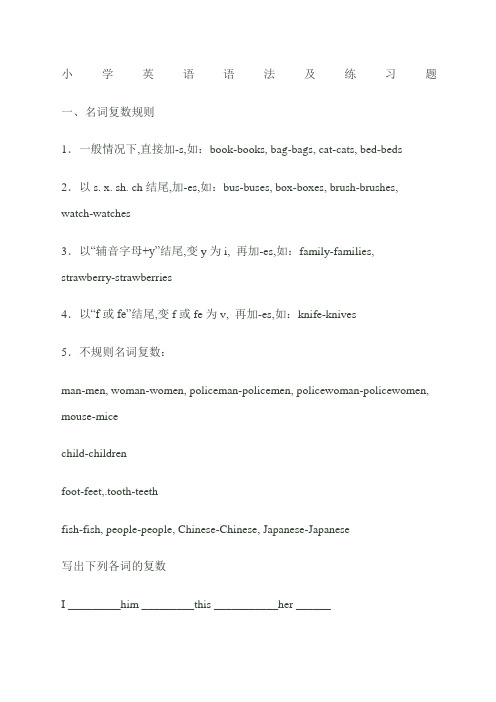
小学英语语法及练习题一、名词复数规则1.一般情况下,直接加-s,如:book-books, bag-bags, cat-cats, bed-beds 2.以s. x. sh. ch结尾,加-es,如:bus-buses, box-boxes, brush-brushes, watch-watches3.以“辅音字母+y”结尾,变y为i, 再加-es,如:family-families, strawberry-strawberries4.以“f或fe”结尾,变f或fe为v, 再加-es,如:knife-knives5.不规则名词复数:man-men, woman-women, policeman-policemen, policewoman-policewomen, mouse-micechild-childrenfoot-feet,.tooth-teethfish-fish, people-people, Chinese-Chinese, Japanese-Japanese写出下列各词的复数I _________him _________this ___________her ______watch _______child _______photo ________diary ______day________ foot________ book_______ dress ________tooth_______ sheep ______box_______ strawberry _____thief _______yo-yo ______ peach______ sandwich ______man______ woman_______ paper_______ juice___________water________ milk________ rice__________ tea__________二、一般现在时一般现在时基本用法介绍No. 1一般现在时的功能1.表示事物或人物的特征、状态;如:The sky is blue.天空是蓝色的;2.表示经常性或习惯性的动作;如:I get up at six every day.我每天六点起床;3.表示客观现实;如:The earth goes around the sun.地球绕着太阳转;一般现在时的构成1. be动词:主语+beam,is,are+其它;如:I am a boy.我是一个男孩;2.行为动词:主语+行为动词+其它;如:We study English.我们学习英语;当主语为第三人称单数he, she,it时,要在动词后加"-s"或"-es";如:Mary likes Chinese.玛丽喜欢汉语;一般现在时的变化1. be动词的变化;否定句:主语+ be + not +其它;如:He is not a worker.他不是工人;一般疑问句:Be +主语+其它;如:-Are you a student-Yes. I am. / No, I'm not.特殊疑问句:疑问词+一般疑问句;如:Where is my bike2.行为动词的变化;否定句:主语+ don't doesn't +动词原形+其它;如:I don't like bread.当主语为第三人称单数时,要用doesn't构成否定句;如:He doesn't often play.一般疑问句:Do Does +主语+动词原形+其它;如:- Do you often play football- Yes, I do. / No, I don't.当主语为第三人称单数时,要用does构成一般疑问句;如:- Does she go to work by bike- Yes, she does. / No, she doesn't.特殊疑问句:疑问词+一般疑问句;如:How does your father go to work 动词+s的变化规则1.一般情况下,直接加-s,如:cook-cooks, milk-milks2.以s. x. sh. ch. o结尾,加-es,如:guess-guesses, wash-washes,watch-watches, go-goes3.以“辅音字母+y”结尾,变y为i, 再加-es,如:study-studies一般现在时用法专练:一、写出下列动词的第三人称单数drink ________ go _______ stay ________ make ________look _________ have_______ pass_______ carry ____ come________ watch______ plant_______ fly ________ study_______ brush________ do_________ teach_______二、用括号内动词的适当形式填空;1. He often ________have dinner at home.2. Daniel and Tommy _______be in Class One.3. We _______not watch TV on Monday.4. Nick _______not go to the zoo on Sunday.5. ______ they ________like the World Cup6. What _______they often _______do on Saturdays7. _______ your parents _______read newspapers every day8. The girl _______teach us English on Sundays.9. She and I ________take a walk together every evening.10. There ________be some water in the bottle.11. Mike _______like cooking.12. They _______have the same hobby.13. My aunt _______look after her baby carefully.14. You always _______do your homework well.15. I _______be ill. I’m staying in bed.16. She _______go to school from Monday to Friday.17. Liu Tao _______do not like PE.18. The child often _______watch TV in the evening.19. Su Hai and Su Yang _______have eight lessons this term.20. -What day _______be it today-It’s Saturday.三、按照要求改写句子1. Daniel watches TV every evening.改为否定句___________________________________________________2. I do my homework every day.改为一般疑问句,作否定回答________________________________________________________ 3. She likes milk.改为一般疑问句,作肯定回答___________________________4. Amy likes playing computer games.改为一般疑问句,作否定回答___________________________________________________5. We go to school every morning.改为否定句_______________________________________________________ 6. He speaks English very well.改为否定句___________________________________________________7. I like taking photos in the park.对划线部分提问________________________________________________________ 8. John comes from Canada.对划线部分提问___________________________________________________9. She is always a good student.改为一般疑问句,作否定回答________________________________________________________ 10. Simon and Daniel like going skating.改为否定句___________________________________________________五、改错划出错误的地方,将正确的写在横线上1. Is your brother speak English __________________2. Does he likes going fishing __________________3. He likes play games after class. __________________4. Mr. Wu teachs us English. __________________5. She don’t do her homework on Sundays. _________________三、现在进行时1.现在进行时表示现在正在进行或发生的动作,也可表示当前一段时间内的活动或现阶段正在进行的动作;2.现在进行时的肯定句基本结构为be+动词ing.3.现在进行时的否定句在be后加not;4.现在进行时的一般疑问句把be动词调到句首;5.现在进行时的特殊疑问的基本结构为:疑问词不达意+ be + 主语+ 动词ing但疑问词当主语时其结构为:疑问词不达意+ be + 动词ing动词加ing的变化规则1.一般情况下,直接加ing,如:cook-cooking2.以不发音的e结尾,去e加ing,如:make-making, taste-tasting3.如果末尾是一个元音字母和一个辅音字母,双写末尾的辅音字母,再加ing,如:run-running, stop-stopping现在进行时专项练习:一、写出下列动词的现在分词:play________ run__________ swim _________make__________go_________ like________ write________ _ski___________read________ have_________ sing ________ dance_________put_________ see________ buy _________ love____________live_______ take_________ come ________ get_________stop_________ sit ________ begin________ shop___________二、用所给的动词的正确形式填空:1.The boy __________________ drawa picture now.2. Listen .Some girls _______________ singin the classroom .3. My mother _________________ cook some nice food now.4. What _____ you ______ do now5. Look . They _______________ have an English lesson .6.They ____________not ,water the flowers now.7.Look the girls ________________dance in the classroom .8.What is our granddaughter doing She _________listen to music.9. It’s 5 o’clock now. We _____________havesupper now10.______Helen____________wash clothes Yes ,she is .三、句型转换:1. They are doing housework .分别改成一般疑问句和否定句__________________________________________________________________________________________________________________________ 2.The students are cleaning the classroom . 改一般疑问句并作肯定和否定回答________________________________________________________________ _________________________________________________________________ _3.I’m playing the football in the playground .对划线部分进行提问________________________________________________________________ _4.Tom is reading books in his study . 对划线部分进行提问四、将来时理论及练习一、概念:表示将要发生的动作或存在的状态及打算、计划或准备做某事;句中一般有以下时间状语:tomorrow, next dayweek, month, year…,soon, the day after tomorrow后天等;二、基本结构:①be going to + do;②will+ do.三、否定句:在be动词am, is, arel后加not或情态动词will后加not成won’t;例如:I’m going to have a picnic this afternoon.→ I’m not going to have a picnic this afternoon.四、一般疑问句:be或will提到句首,some改为any, and改为or,第一二人称互换;例如:We are going to go on an outing this weekend. → Are you going to go on an outing this weekend五、对划线部分提问;一般情况,一般将来时的对划线部分有三种情况;1. 问人;Who 例如:I’m going to New York soon. →Who’s going to New York soon.2. 问干什么;What … do.例如:My father is going to watch a race with me thisafternoon. →What is your father going to do with you this afternoon.3. 问什么时候;When.例如:She’s going to go to bed at nine. →When is she goingto bed六、同义句:be going to = willI am going to go swimming tomorrow明天. = I will go swimming tomorrow. 练习:填空;1. 我打算明天和朋友去野炊;I_____ _______ _________ have a picnic with my friends.I ________ have a picnic with my friends.2. 下个星期一你打算去干嘛我想去打篮球;What ________ ________ _________ _________ _________ next Monday I _______ ______ _____ play basketball.What _________ you do next Monday I ________ play basketball.3. 你妈妈这个周末去购物吗是,她要去买一些水果;_____ your mother _______ ________ go shopping this ___________Yes, she _________. She ______ ________ __________ buy some fruit.4. 你们打算什么时候见面;What time _______ you _________ __________ meet改句子;5. Nancy is going to go camping.改否定Nancy ________ going to go camping.6. I’ll go and join them.改否定I _______ go ______ join them.7. I’m going to get up at 6:30 tomorrow.改一般疑问句________ _______ ________ to get up at 6:30 tomorrow8. We will meet at the bus stop at 10:30.改一般疑问句_______ ________ meet at the bus stop at 10:30.9. She is going to listen to music after school.对划线部分提问________ _______ she ________ ________ _________ after school10. My father and mother are going to see a play the day after tomorrow.同上_________ _________ going to see a play the day after tomorrow.用所给词的适当形式填空;11. Today is a sunny day. We ___________________ have a picnic this afternoon.12. My brother _______________ go to Shanghai next week.13. Tom often ______________go to school on foot. But today is rain. He ______________ go to school by bike.14. What do you usually do at weekends I usually __________ watch TV and ____________catch insects15. It’s Friday today. What _____she _________ do this weekend She ______________ watch TV and _____________ catch insects.16. What ___________ d0 you do last Sunday I ____________ pick apples on a farm. What ______________ do next Sunday I ______________ milk cows.17. Mary ____________ visit her grandparents tomorrow.18. Liu Tao ____________ fly kites in the playground yesterday.19. David ______________ give a puppet show next Monday.20. I ________________ plan for my study now五、一般过去时1.一般过去时表示过去某个时间发生的动作或存在的状态,常和表示过去的时间状语连用;一般过去时也表示过去经常或反复发生的动作感谢; 2.Be动词在一般过去时中的变化:⑴am 和is在一般过去时中变为was;was not=wasn’t⑵are在一般过去时中变为were;were not=weren’t⑶带有was或were的句子,其否定、疑问的变化和is, am, are一样,即否定句在was或were后加not,一般疑问句把was或were调到句首;3.句中没有be动词的一般过去时的句子否定句:didn’t +动词原形,如:Jim didn’t go home yesterday.一般疑问句:在句首加did,句子中的动词过去式变回原形;如:Did Jim go home yesterday特殊疑问句:⑴疑问词+did+主语+动词原形如:What did Jim do yesterday⑵疑问词当主语时:疑问词+动词过去式如:Who went to home yesterday动词过去式变化规则:1.一般在动词末尾加-ed,如:pull-pulled, cook-cooked2.结尾是e加d,如:taste-tasted3.末尾只有一个元音字母和一个辅音字母的重读闭音节,应双写末尾的辅音字母,再加-ed,如:stop-stopped4.以“辅音字母+y”结尾的,变y为i, 再加-ed,如:study-studied5.不规则动词过去式:am,is-was, are-were, do-did, see-saw, say-said, give-gave, get-got, go-went, come-came, have-had, eat-ate, take-took, run-ran, sing-sang, put-put,make-made, read-read, write-wrote, draw-drew, drink-drank, fly-flew, ride-rode, speak-spoke, sweep-swept, swim-swam, sit-sat过去时练习写出下列动词的过去式isam_________ fly_______ plant________ are ________drink_________ play_______ go________ make ________does_________ dance________ worry________ ask _____taste_________ eat__________ draw________ put ______throw________ kick_________ pass_______ do ________Be动词的过去时练习1Name ____________ No. ______ Date __________一、用be动词的适当形式填空1. I _______ at school just now.2. He ________ at the camp last week.3. We ________ students two years ago.4. They ________ on the farm a moment ago.5. Yang Ling ________ eleven years old last year.6. There ________ an apple on the plate yesterday.7. There ________ some milk in the fridge on Sunday.8. The mobile phone _______ on the sofa yesterday evening.二、句型转换1. It was exciting.否定句:________________________________________________ 一般疑问句:____________________________________________ 肯、否定回答:__________________________________________ 2. All the students were very excited.否定句:________________________________________________一般疑问句:____________________________________________ 肯、否定回答:__________________________________________ 3. They were in his pocket.否定句:________________________________________________ 一般疑问句:____________________________________________ 肯、否定回答:__________________________________________ Be动词的过去时练习2Name ____________ No. ______ Date __________一、用be动词的适当形式填空1. I ______ an English teacher now.2. She _______ happy yesterday.3. They _______ glad to see each other last month.4. Helen and Nancy ________ good friends.5. The little dog _____ two years old this year.6. Look, there ________ lots of grapes here.7. There ________ a sign on the chair on Monday..8. Today _____ the second of June. Yesterday ______ the first of June. It _____ Children’s Day. All the students ______ very excited.二、句型转换1. There was a car in front of the house just now.否定句:________________________________________________一般疑问句:____________________________________________肯、否定回答:__________________________________________肯、否定回答:__________________________________________三、中译英1.我的故事书刚才还在手表旁边;___________________________________________________________ 2.他们的外套上个礼拜放在卧室里了;___________________________________________________________ 3.一会以前花园里有两只小鸟;行为动词的过去时练习1Name ____________ No. ______ Date __________一、用行为动词的适当形式填空1. He _________ live in Wuxi two years ago.2. The cat ________ eat a bird last night.3. We _______ have a party last Halloween.4. Nancy ________ pick up oranges on the farm last week.5. I ________ make a model ship with Mike yesterday.6. They ________ play chess in the classroom last PE lesson.7. My mother _______ cook a nice food last Spring Festival.8. The girls ________ sing and _______ dance at the party.二、句型转换1. Su Hai took some photos at the Sports day.否定句:________________________________________________ 一般疑问句:____________________________________________ 肯、否定回答:__________________________________________2. Nancy went to school early.否定句:________________________________________________ 一般疑问句:____________________________________________ 肯、否定回答:__________________________________________ 3. We sang some English songs.否定句:________________________________________________ 一般疑问句:____________________________________________ 肯、否定回答:__________________________________________ 行为动词的过去时练习2Name ____________ No. ______ Date __________一、用be动词的适当形式填空1. I ______ watch a cartoon on Saturday.2. Her father _______ read a newspaper last night.3. We _________ to zoo yesterday, we _____ to the park. go4. ______ you _______ visit your relatives last Spring Festival5. ______ he _______ fly a kite on Sunday Yes, he ______.6. Gao Shan _______ pull up carrots last National Day holiday.7. I ____________ sweep the floor yesterday, but my mother ______.8. What ______ she _______ find in the garden last morning She __________ find a beautiful butterfly.二、句型转换1. They played football in the playground.否定句:________________________________________________一般疑问句:____________________________________________肯、否定回答:__________________________________________三、中译英1. 格林先生去年住在中国;________________________________________________________2. 昨天我们参观了农场;________________________________________________________3. 他刚才在找他的手机;________________________________________________________ 过去时综合练习1Name ____________ No. ______ Date __________一、用动词的适当形式填空1. It ______ be Ben’s birthday last Friday.2. We all ______ have a good time last night.3. He ________ jump high on last Sports Day.4. Helen ________ milk a cow on Friday.5. She likes ______ newspapers, but she ______ a book yesterday. read6. He _______ football now, but they _______ basketball just now. play7. Jim’s mother _________ plant trees just now.8. _______ they ________ sweep the floor on Sunday No, they _____.9. I _______ watch a cartoon on Monday.10. We ___________ go to school on Sunday.。
PEP小学英语语法要点及精选习题-答案
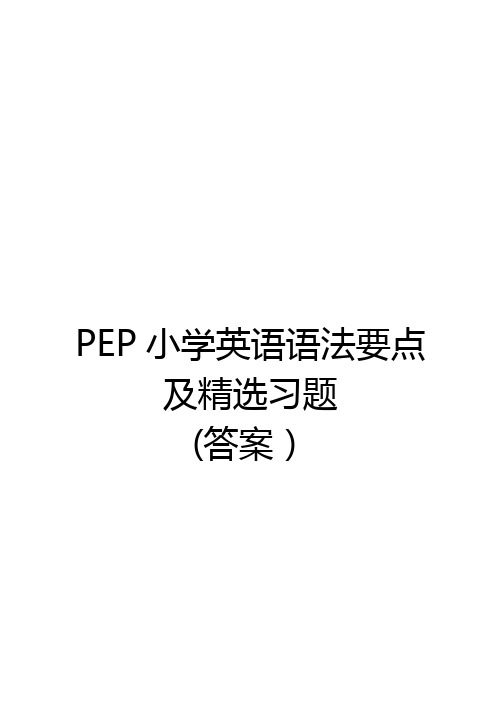
一、写出下列动词的现在分词:
play_playing_run__running__swim __swimming__make__making___
go___going___ski__skiing___
read_reading_have__having__sing __singing___dance_dancing__
3.What are you doingin the playground?
4.What isTomdoing in his study?
四、一般将来时
一、填空。
1。我打算明天和朋友去野炊。
Iamgoingtohave a picnic with my friends。
Iwillhave a picnic with my friends。
come - camehave - hadeat - atetake - took
run - ransing - sangput - putmake - made
read - readwrite - wrotedraw - drewdrink - drank
fly - flewride - rodespeak - spokesweep - swept
19. Davidwill givea puppet show next Monday.
20. Iis planningfor my study now
五、一般过去时
am,is - wasare - weredo - didsee - saw
say - saidgive - gaveget - gotgo - went
looklooksdrawdrawsdropdropsgivegives
(完整)小学英语六年级总复习语法及练习题(一).docx
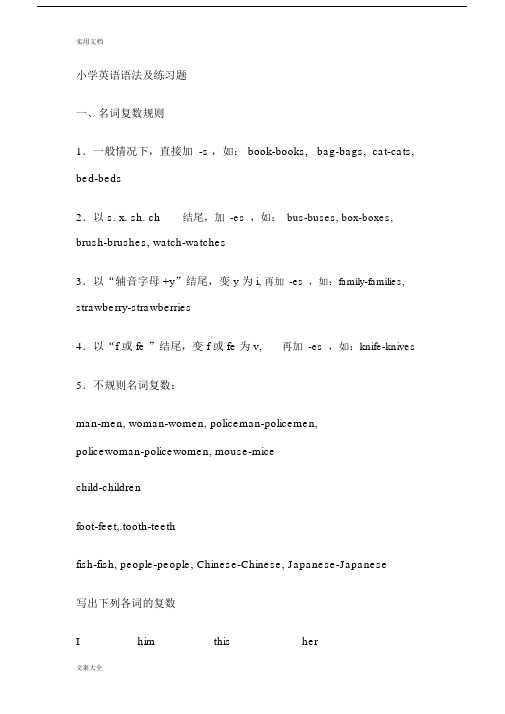
小学英语语法及练习题一、名词复数规则1.一般情况下,直接加 -s ,如: book-books, bag-bags, cat-cats, bed-beds2.以 s. x. sh. ch结尾,加-es,如:bus-buses, box-boxes, brush-brushes, watch-watches3.以“辅音字母 +y”结尾,变 y 为 i,再加-es,如:family-families, strawberry-strawberries4.以“f 或 fe ”结尾,变 f 或 fe 为 v,再加-es,如:knife-knives 5.不规则名词复数:man-men, woman-women, policeman-policemen,policewoman-policewomen, mouse-micechild-childrenfoot-feet,.tooth-teethfish-fish, people-people, Chinese-Chinese, Japanese-Japanese写出下列各词的复数I _________him _________this ___________her ______watch _______child _______photo ________diary ______day________ foot________ book_______ dress ________tooth_______ sheep ______box_______ strawberry _____thief _______yo-yo ______ peach______ sandwich ______man______ woman_______ paper_______juice___________ water________ milk________ rice__________ tea__________二、一般现在时一般现在时基本用法介绍【No. 1 】一般现在时的功能1. 表示事物或人物的特征、状态。
小学英语语法训练120题及答案

什么是名词?[1分]A有名的词B人或事物及概念的名称C有名字的词考生答案:参考答案:B查看解析2.表示可以计数的事物的名称的名词叫可数名词 .[1分] A正确B错误C不知道考生答案:参考答案:A查看解析3.不可以计数的名词叫不可数名称 .[1分]A正确B错误C不知道考生答案:参考答案:A查看解析4.大多数可数名词的复数都在词尾加-es[1分]A正确B错误C不知道考生答案:参考答案:B查看解析5.What’s the weather like today?It’s________[1分] ArainBwindyCsun考生答案:参考答案:B查看解析6.可数名词复数在词尾加-es的情况是:[1分]A以-s,-x,-sh,ch结尾的可数名词;B以-f/-fe结尾的词;C以-o结尾的名词考生答案:参考答案:A查看解析7.leaf的复数形式是:[1分]AleafsBleafesCleaves考生答案:参考答案:C查看解析8.What do you have _______lunch?[1分]AinBforCat考生答案:参考答案:B查看解析9.Tom and Mary have bread and milk _____the morning.[1分] AinBonCat考生答案:参考答案:A查看解析10.Does it ____in Guangzhou ?[1分]ArainingBrainsCrain考生答案:参考答案:C查看解析11.The bank is _______my uncle’s home.[1分] Anext toBinCto考生答案:参考答案:A查看解析12.How many _____are there under the tree?[1分] AmanBwomenCwoman考生答案:参考答案:B查看解析13.This is _ egg.[1分]AandBorCan考生答案:参考答案:C查看解析14.______does Ben go to school? By bus .[1分]AHowBWhatCWhere考生答案:参考答案:A查看解析15.______is that ? That’s my cousin.[1分]AWhoBWhatCWhose考生答案:参考答案:A查看解析16.I usually ride the bike after school ______Mondays.[1分] AonBinCat考生答案:参考答案:A查看解析17.以下复数名词正确的是:[1分]AhappiesheavysCbabies考生答案:参考答案:C查看解析18.I get up ____7:00 every morning .[1分] AinBonCat考生答案:参考答案:C查看解析19.My friend likes ______[1分]Arunning and swimmingBcook and singCrun and dance考生答案:参考答案:A查看解析20.Tom is ______than Ben.[1分]AheavyBheavyerCheavier考生答案:参考答案:C查看解析21.Tony is 14, Jim is 15 .Tony is ______than Jim.[1分] AyoungerBbiggerColder考生答案:参考答案:A查看解析22.______is your birthday?[1分]AWhereBWhenCWhat考生答案:参考答案:B查看解析23.______is that ? That’s Tom’s mother.[1分]AWhatBWhoseCWho考生答案:参考答案:C查看解析24.Is your mother ______? Yes, she is.[1分] AcookBcooksCcooking考生答案:参考答案:C查看解析25.This is peter . He’s ______[1分]Atall and shortBtall and youngCyoung and old考生答案:参考答案:B查看解析26.以下名词复数正确的是:[1分]AgeeseBmousesCfootsDtoothes考生答案:参考答案:A查看解析27.Look, some children ______our school![1分] AvisitsBvisitCare visiting考生答案:参考答案:C查看解析28.Are you in China ______ January ? Yes, I usually in China _____January.[1分]Ain, onBin,inCat ,in考生答案:参考答案:B查看解析29.a child是一个小孩,很多小孩是:[1分]AchildsBchildrenCchildes考生答案:参考答案:B查看解析30.My friend peter _____very well.[1分]AswimBrunningCsings考生答案:参考答案:C查看解析31.The red bag is___,but it’s ______than the green one.[1分] Abig, smallBheavier ,lightCcheap , nicer考生答案:参考答案:C查看解析32._______pens do you have ? I have nine.[1分]AHow manyBHow muchCHow old考生答案:参考答案:A查看解析33.Mr Guo usually _____shorts in July.[1分]AwearBwearsCwearing考生答案:参考答案:B查看解析34.单复数同形的名词有:[1分]AChinese sheepBdeer gooseCsheep class考生答案:参考答案:A查看解析35.Let’s _____with the computer ,tom.[1分]AplayBplaysCplaying考生答案:参考答案:A查看解析36.Don’t talk _______class.[1分]AinBatCon考生答案:参考答案:A查看解析37.Li Lei _____like fish , but his sister ______.[1分] Adon’t doBdoesn’t doesCaren’t is考生答案:参考答案:B查看解析38.My sisters ______play basketball after school.[1分]Adon’tBdoesn’tCaren’t考生答案:参考答案:A查看解析39._____your grandma and grandpa come from China ? Yes , they _______[1分]ADo, doesBDoes ,doesCDo , do考生答案:参考答案:C查看解析40.Don’t ____in class. Let’s ______to the teacher.[1分]Atalking, listeningBtalks, listensCtalk , listen考生答案:参考答案:C查看解析41.Is she ____TV now?[1分]AwatchBwashingCwatching考生答案:参考答案:C查看解析42.____ I speak to Ann, please? ______[1分]ACan , noBMay , of courseCMust , ok考生答案:参考答案:B查看解析43.I ____to the tape yesterday evening.[1分] AlookBlistenClistened考生答案:参考答案:C查看解析44.I have a ____coat, my brother has an____jacket.[1分]Anew ,oldBclean , dirtyCbig , small考生答案:参考答案:A查看解析45.集体名词既可作单数(视为整体),也可作复数(视为成员)。
(完整版)小学英语语法及习题

小学英语语法及习题一、名词复数规则1.一般状况下,直接加 -s ,如:book-books, bag-bags, cat-cats, bed-beds2.以 s. x. sh. ch结尾,加-es,如:bus-buses, box-boxes, brush-brushes, watch-watches3.以“辅音字母 +y”结尾,变 y 为 i,再加-es,如:family-families, strawberry-strawberries4.以“f或 fe ”结尾,变 f 或 fe 为 v,再加-es,如:knife-knives5.不规则名词复数:man-men, woman-women, policeman-policemen, policewoman-policewomen, mouse-micechild-childrenfoot-feet,.tooth-teethfish-fish, people-people, Chinese-Chinese,Japanese-Japanese写出以下各词的复数I _________him _________this ___________her______watch _______child _______photo ________diary______day________ foot________ book_______ dress________tooth_______ sheep ______box_______ strawberry_____thief _______yo-yo ______ peach______ sandwich______man______ woman_______paper_______juice___________water________ milk________ rice__________tea__________二、一般此刻时一般此刻时基本用法介绍【No. 1 】一般此刻时的功能1.表示事物或人物的特点、状态。
(完整版)小学英语语法及练习题
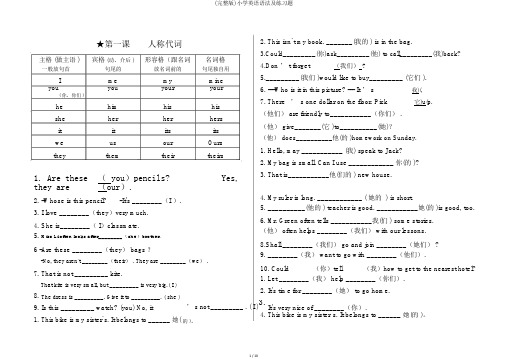
★第一课人称代词主格 (做主语 )宾格 (动、介后 )形容格(跟名词名词格一般放句首句尾的放名词前的句尾独自用I me my mine youyouyouryour ( 你,你们 )he him his his she her her hers it it its its weus our Ours theythemtheirtheirs1. Are these ( you )pencils? Yes,they are (our ).2. This isn`t my book. _______(我的 ) is in the bag.3.Could_________(你)ask_________(他) to call_________(我)back?4.Don ’ t forget (我们) ?5._________(我们 )would like to buy_________ (它们 ).6. ---Who is it in this picture? --- It ’ s 我)(.7. There ’ s one dollar on the floor. Pick它)u(p.(他们) are friendly to___________(你们) .(他) give_______(它 )to__________(她)?(他) does__________他(的 )homework on Sunday.1. Hello, may ___________ (我) speak to Jack?2. My bag is small. Can I use ____________ 你(的 )?3. That is___________他(们的 ) new house.2. -Whose is this pencil?-It's ________(I ).4. My ruler is long. ____________ ( 她的 ) is short.5. __________(他的 ) teacher is good. ___________她(的 )is good, too. 3. I love ________(they )very much.6. Mr. Green often tells ___________我(们 ) some stories. 4. She is________( I )classmate. (他) often helps ________(我们) with our lessons.5.Miss Li often looks after________(she )brother.6 -Are these ________(they ) bags ?8.Shall ________(我们) go and join ________(她们) ? 9. ________(我) want to go with ________(他们).-No, they aren't ________(their ) . They are ________(we ) .7. That is not _________ kite.10. Could(你)tell (我)how to get to the nearest hotel? 1. Let ________(我) help ________(你们). That kite is very small, but _________ is very big.( I )It's time for ________(她) to go home.8.2. The dress is _________. Give it to _________. ( she )9. Is this _________ watch? (you) No, it’ s not _________ . ( I )3.It's very nice of ________(你).1. This bike is my sister`s. It belongs to ______ 她( 4. This bike is my sister`s. It belongs to ______ 她(的 )。
英语语法练习(精选5篇)

英语语法练习(精选5篇)1.英语语法练习第1篇格(case)是名词或代词具有的形式及其变化,表示与其它词的关系。
英语的名词有三个格:主格(nominative case)、宾语(objective case)和所有格(possessive case)。
但英语的名词除所有格有形式的变化外,主格和宾格都没有形式变化。
名词在句中是主格或是宾格,主要通过它在句中的作用和位置来确定。
如:My brother always misplaces his 我弟弟常常乱放他的书包。
(brother是主语,故为主格;schoolbag是misplaces的宾语,故是宾格)Every written sentence should begin with a capital 每个书写出来的句子开头都要用大写字母。
(sentence在句中作主语,故是主格;letter是介词with的宾语,故是宾格)表示有生命的东西的名词的所有格表示有生命的东西的名词(人或动物)的末尾,加上's,即构成所有格,可放在另一名词之前,作定语用。
如:John's friend约翰的朋友Xiao Wang's notebook小王的笔记本children's books儿童读物my father's room我父亲的房间[英语语法手册]英语名词所有格与它所修饰的名词的逻辑关系名词所有格在逻辑上可能是它所修饰的名词的主语,也可能是它所修饰的名词的宾语。
1)名词所有格是它所修饰的名词的逻辑主语。
如:the Party's concern of the younger generation党对年青一代的关怀the hatred of the soldiers for the enemy士兵对敌人的仇恨2)名词所有格是它所修饰的名词的逻辑宾语。
如:the reactionary rule's overthrow反动统治的被推翻the occupation of the city by the enemy敌人对该城的占领"of+名词所有格"上面讲的两种所有格的形式可以结合起来,构成"of'+所有格"形式,表示部分观念或感情色彩。
小学英语语法练习题及答案
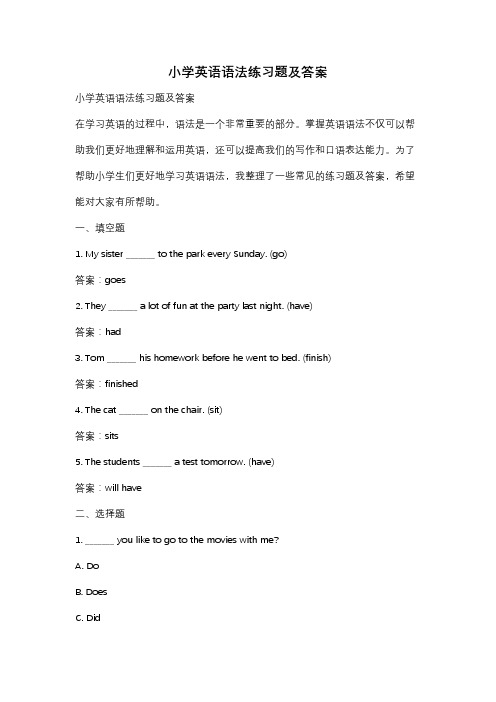
小学英语语法练习题及答案小学英语语法练习题及答案在学习英语的过程中,语法是一个非常重要的部分。
掌握英语语法不仅可以帮助我们更好地理解和运用英语,还可以提高我们的写作和口语表达能力。
为了帮助小学生们更好地学习英语语法,我整理了一些常见的练习题及答案,希望能对大家有所帮助。
一、填空题1. My sister _______ to the park every Sunday. (go)答案:goes2. They _______ a lot of fun at the party last night. (have)答案:had3. Tom _______ his homework before he went to bed. (finish)答案:finished4. The cat _______ on the chair. (sit)答案:sits5. The students _______ a test tomorrow. (have)答案:will have二、选择题1. _______ you like to go to the movies with me?A. DoB. DoesC. Did答案:A2. My mother _______ cooking dinner in the kitchen now.A. isB. amC. areD. be答案:A3. We _______ to the zoo last Sunday.A. goB. goesC. wentD. will go答案:C4. _______ she like playing basketball?A. DoB. DoesC. DidD. Will答案:B5. I _______ a new bike for my birthday.A. getC. gotD. will get答案:D三、改错题1. She goes to school by bus every day.答案:goes → go2. He have a lot of friends in his new school.答案:have → has3. They is playing soccer in the park now.答案:is → are4. I will go to the beach tomorrow if it will not rain.答案:will → does5. My brother and I likes to watch movies on weekends. 答案:likes → like四、连词成句1. you / to / the / park / go / do / on / weekends / ?答案:Do you go to the park on weekends?2. yesterday / to / the / we / movies / went / .答案:We went to the movies yesterday.3. is / reading / book / my / sister / a / now / .答案:My sister is reading a book now.4. have / time / do / you / what / to / ?答案:What do you have to do?5. will / the / party / at / have / we / tomorrow / house / our / .答案:We will have the party at our house tomorrow.通过这些练习题,我们可以巩固和运用所学的英语语法知识。
小学英语语法练习题及答案

小学英语语法练习题及答案一、名词练习1. 单复数名词- 单数名词变复数名词:- Book → Books- Child → Children- Foot → Feet2. 名词所有格- 表示所有关系的名词:- The cat's tail (猫的尾巴)- My father's car (我爸爸的车)答案:1.- Books- Children- Feet2.- The cat has a long tail.- His car is new.二、动词练习1. 动词的时态- 现在进行时:- She is reading a book.- 一般过去时:- They walked to school.2. 动词的第三人称单数- He plays football every day.答案:1.- She is reading a book now.- Yesterday, they walked to school. 2.- He plays football every day.三、形容词和副词练习1. 形容词比较级和最高级- 比较级:Bigger, faster- 最高级:The biggest, the fastest2. 副词的使用- 副词修饰动词:- She runs quickly.答案:1.- The cat is bigger than the dog.- This is the fastest car in the race.2.- She runs quickly to catch the bus.四、代词练习1. 人称代词- 主格代词:I, you, he, she, it- 宾格代词:me, you, him, her, it2. 物主代词- 形容词性物主代词:my, your, his, her, its - 名词性物主代词:mine, yours, his, hers, its答案:1.- I am going to the park. (主格)- Can you pass the ball to me? (宾格)2.- This is my book. (形容词性)- The book is mine. (名词性)五、介词练习1. 表示时间的介词- In, on, at- In the morning, on Monday, at 5 o'clock2. 表示地点的介词- In, on, at, to- In the classroom, on the desk, at the zoo, to the library答案:1.- I wake up in the morning.- We have a party on my birthday.- The meeting starts at 3 PM.2.- The cat is in the box.- The book is on the table.- We go to the park.六、疑问句练习1. 一般疑问句- Do you like apples?- Does she have a sister?2. 特殊疑问句- What is your name?- Where are you going?答案:1.- Yes, I do.- No, she doesn't.2.- My name is Tom.- I am going to the cinema.。
小学英语语法练习题含答案

小学英语语法练习题含答案在小学英语教学中,语法练习是非常重要的一部分,它帮助学生掌握语言的基本规则。
以下是一些适合小学生的英语语法练习题,以及相应的答案。
练习题1:用正确的时态填空。
1. I am (be) at home now.2. She goes (go) to school every day.3. They played (play) soccer yesterday.答案:1. am2. goes3. played练习题2:选择正确的词填空。
1. This is/are my parents.2. There is/are a book and two pencils on the table.3. Does/Do your sister have a cat?答案:1. are2. is3. Does练习题3:用适当的疑问词填空。
1. What color is the sky?2. Where are you going?3. Who is your teacher?答案:1. What2. Where3. Who练习题4:用正确的形式填空。
1. She has/have a big family.2. I like/likes apples and bananas.3. They do/does their homework every evening.答案:1. has2. like3. do练习题5:改写句子为否定句。
1. He is a good student.2. We have a new computer.3. They play basketball after school.答案:1. He is not a good student.2. We do not have a new computer.3. They do not play basketball after school.练习题6:将下列句子转换为一般疑问句,并给出肯定和否定回答。
(完整)小学英语六年级总复习语法及练习题(一)
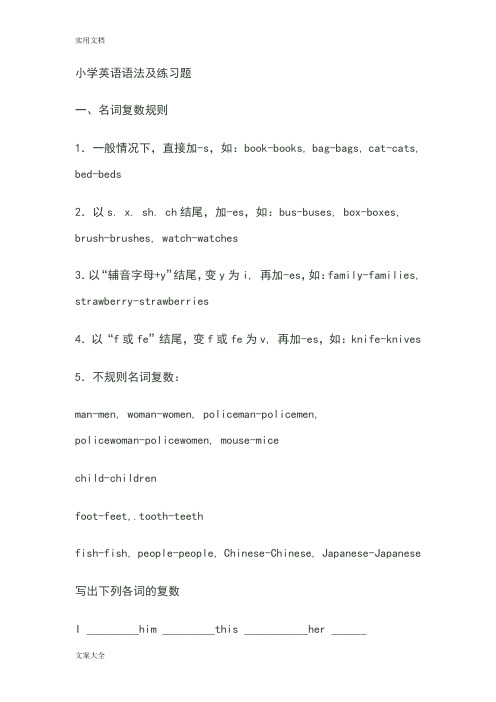
小学英语语法及练习题一、名词复数规则1.一般情况下,直接加-s,如:book-books, bag-bags, cat-cats, bed-beds2.以s. x. sh. ch结尾,加-es,如:bus-buses, box-boxes, brush-brushes, watch-watches3.以“辅音字母+y”结尾,变y为i, 再加-es,如:family-families, strawberry-strawberries4.以“f或fe”结尾,变f或fe为v, 再加-es,如:knife-knives 5.不规则名词复数:man-men, woman-women, policeman-policemen,policewoman-policewomen, mouse-micechild-childrenfoot-feet,.tooth-teethfish-fish, people-people, Chinese-Chinese, Japanese-Japanese 写出下列各词的复数I _________him _________this ___________her ______watch _______child _______photo ________diary ______day________ foot________ book_______ dress ________tooth_______ sheep ______box_______ strawberry _____thief _______yo-yo ______ peach______ sandwich ______man______ woman_______ paper_______ juice___________ water________ milk________ rice__________ tea__________ 二、一般现在时一般现在时基本用法介绍【No. 1】一般现在时的功能1.表示事物或人物的特征、状态。
(完整版)小学英语语法专项练习题含答案

小学英语语法专项练习题含答案(1)小学生语法专项练习题名词练习一 . 写出以下单数名词的复数形式答案 :1 oranges 2. Boxes 3. women 4. tomatoes 5.buses 6. boys7babies 8.watches 9. Photos 10 classes 11. feet 12 houses 13 pens 14 cars15 horses 16. radios 17 dishes 18 children二 . 将以下单词的复数形式改成单数形式1.doctors_________2.cities_______3.pianos__________4..ears________________ 10.knives__________11.men _________12.pears _________答案1. doctor 2 city 3 piano 4. ear 5. church 6. leaf 7 tooth 8zoo 9brush10 knife11.man 12 pear三 . 请从括号里选出正确的答案1.Please give me__(two /two cups of )coffee.2.There are a lot of___(sheep /sheeps ) on the farm.3.I ’d like some__ (bread / breads ) and___ (potato /potatoes).4.Look! There is a ___(mouse /mice) in the corner.5.He bought_____(a piece of /a piece ) paper.6.“Where is___ (Woman’s / Women’s) Room?” asked Susan.7.____ (The girl’s/The girls’ ) hobby is drawing.8.Aunt Lucy sent_____ (a child’s /a children ’ s ) book to me.红色为答案冠词练习1一 . 在空格内填上 a 或 anbook 14.______easy question 15.______orange dress16_______X-ray machine 17______ice cream答案1.16.an 17 an二 . 选择填空1.Mom tells her little daughter _____ old story every night. A. a B./ C. an D. the2. ______computer on the table is’s.Susan A. A B. An C. The D. /3.There is ______ map of the world on ______wall. ______map is mine.A. a, a, AB. a, the, TheC. the, the, TheD. the, the, A5.______Spring comes after______winter.A. /, /B.The, /C.The, theD.A, the6.I bought ______shoes yesterday. ______ shoes are very beautiful. A.a, The B. a pair of, The C. the, The D. a pair, The pair 7.He was ______soldier in the Second World War.A. aB. anC. theD. /8.She can play______ and ______.A. the tennis, the guitarB. tennis, guitarC. the tennis, guitarD. tennis, the guitar9.I can see______moon and ______clouds in the sky. A. the, a B. a, aC. the, /D. the, the11. ______Tian’anmen Square is in__Beijing. A. /, / B. A, / C. The, / D. /, the212. — Can you tell me ______nearest bookshop?— Go straight and turn right at_______third crossing, and youwill see it. A. the, a B. the, the C. a, the D. the, /红色为答案。
小学二年级英语语法及练习题
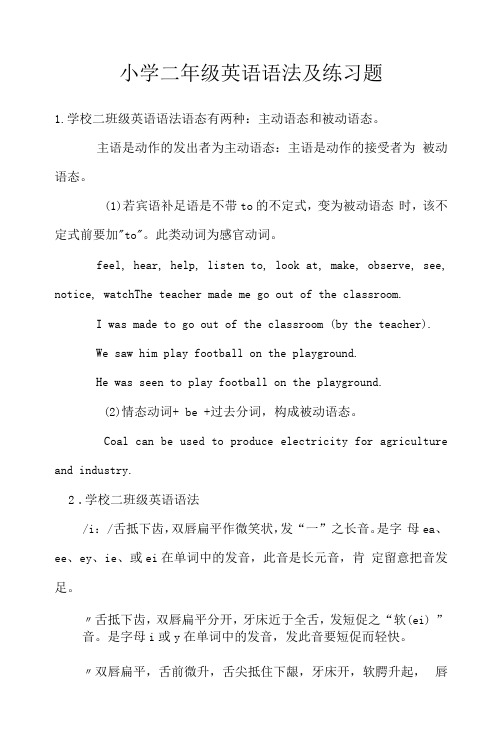
小学二年级英语语法及练习题1.学校二班级英语语法语态有两种:主动语态和被动语态。
主语是动作的发出者为主动语态:主语是动作的接受者为被动语态。
(1)若宾语补足语是不带to的不定式,变为被动语态时,该不定式前要加"to"。
此类动词为感官动词。
feel, hear, help, listen to, look at, make, observe, see, notice, watchThe teacher made me go out of the classroom.I was made to go out of the classroom (by the teacher).We saw him play football on the playground.He was seen to play football on the playground.(2)情态动词+ be +过去分词,构成被动语态。
Coal can be used to produce electricity for agriculture and industry.2.学校二班级英语语法/i:/舌抵下齿,双唇扁平作微笑状,发“一”之长音。
是字母ea、ee、ey、ie、或ei在单词中的发音,此音是长元音,肯定留意把音发足。
〃舌抵下齿,双唇扁平分开,牙床近于全舌,发短促之“软(ei) ”音。
是字母i或y在单词中的发音,发此音要短促而轻快。
〃双唇扁平,舌前微升,舌尖抵住下龈,牙床开,软腭升起,唇自然开放。
是字母a在闭音节或重读闭音节中的发音/e/舌近硬腭,舌尖顶下齿,牙床半开半合,作微笑状。
是字母e 或ea在单词中的发音/3:/舌上抬,唇成自然状态,口半开半闭,发“厄”之长音。
是字母er、ir、or或ur在单词中的发音〃舌上抬,唇成自然状态,口半开半闭,发“厄”之短音。
是字母a、0、u、e、or、er或ur在单词中的发音/a:/双唇张而不圆,牙床大开,舌后微升,舌尖向后升缩微离下齿,发阿之长音。
小学英语语法练习题含答案

小学英语语法练习题含答案一、选择题(每题2分,共20分)1. What is your name?A) What's your name?B) What are you name?C) What name is you?D) What is your name?2. I have two apples.A) I have two apple.B) I haves two apples.C) I has two apples.D) I have two apples.3. She is ________ a new dress.A) wearB) wearingC) woreD) wears4. The cat ________ under the table.A) is sitB) is sittingC) sitsD) sit5. How many books ________ you have?B) doesC) areD) have6. We usually ________ breakfast at seven.A) hasB) haveC) hadD) having7. The children ________ in the park.A) playingB) are playingC) playD) played8. ________ you like some juice?A) DoB) DoesC) IsD) Are9. They ________ to school by bus.A) goesB) goC) goingD) went10. My brother ________ a lot of friends.A) haveC) havingD) had二、填空题(每题2分,共20分)1. My sister ________ (喜欢) music very much.2. ________ (他们) are my parents.3. The dog ________ (在) the garden.4. ________ (我们) go to school every day.5. ________ (她) is reading a book.6. ________ (他们) are playing football.7. ________ (我) am a teacher.8. ________ (你) can play the piano?9. ________ (他) likes to watch TV.10. ________ (我们) have a big family.三、改错题(每题2分,共20分)1. She is go to the park. (×)2. They are play fo otball. (×)3. I am have a new car. (×)4. We are go to the zoo. (×)5. He is like to play basketball. (×)6. She is have a cat. (×)7. They are go to school by bus. (×)8. I am like to read books. (×)9. He is have a big dog. (×)10. We are play in the pa rk. (×)四、翻译题(每题5分,共20分)1. 我有一个好朋友。
小学英语语法--冠词语法精细讲解及对应练习题

A.a
B.an
C. the
D./
5 . To n y h a s _ ___ egg a n d s o m e ve g e t a b le s f o r b r e a kfast.
A.a
B.an
C.some
D.any
冠词习题练一练
6. I have____French stamp. The stamp is beautiful.
at school 上学 at table 在吃饭 in bed (睡、病、躺)在床上 in hospital 住院 by sea 乘船 in front of 在……前面(外部) on earth 究竟
冠词习题练一练
一、填写适当的冠词 _____ball _____book _____apple _____story _____Earth ______egg _____chair _____sun _____pear _____onion 二、用适当的冠词填空 1.___sun is very hot. 2. Can I have ___ apple? 3. Do you want to eat ___ egg? 4. I want to buy ___ new car. 5. Mommy likes to read ___ story. 6. I have ___ blue ball. 7. He broke ___ chair. 8. She reads ___ book in class. 9. I have ___ apple and ___ pear for lunch.
冠词习题练一练 三.圈出正确的冠词 1. Sue had to hurry to catch the / an bus. 2. Clive and Julian played guitar in a / an band. 3. Petey buried an / a bone in Nana's backyard. 4. My school won the / an first place prize for selling candles! 5. I want to ride my bike to the / a friend's house. 6. The / An new computer we bought has iTunes on it. 7. My sneakers have a / an orange stripe on the side. 8. Legos are fun to play with the / a friend or two. 9. We watched a TV show being filmed in a / the town. 10. I watched as mom put the Cream-of-Wheat into a / an pot.
(完整版)小学英语语法一本全附练习题
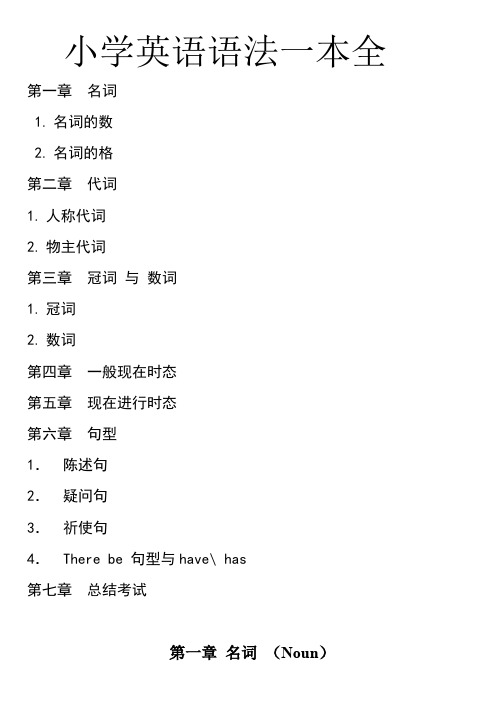
小学英语语法一本全第一章名词1.名词的数2.名词的格第二章代词1.人称代词2.物主代词第三章冠词与数词1.冠词2.数词第四章一般现在时态第五章现在进行时态第六章句型1.陈述句2.疑问句3.祈使句4.There be 句型与have\ has第七章总结考试名词的概念在生活中,我们会接触到各种各样的人和事物,用来表示这些人或事物名称的词就是名词。
一、名词的数名词的数指名词的单数和复数形式。
可数名词表示“一个”时用单数,“两个以上”时用复数;不可数名词表示量时,通常用“数词+单位+of+物质名词”的形式,如 a piece of bread (一片面包),变为复数时,只须将单位名词变为复数,如:two pieces of bread(两片面包)。
*名词复数的构成法则1. 一般情况下在词尾加 s. 词尾读音shop --- shops (商店) 在清辅音后读[ s ]bag --- bags (书包) 在浊辅音后读[ z ]window --- windows (窗户) 在元音后读[ z ]2. 以s, x, sh, ch 结尾的单词在词尾加es。
class --- classes (班级) 词尾读音[ iz ]box --- boxes (盒子)match --- matches (比赛)brush --- brushes (刷子)3. 以“辅音字母+y”结尾的词,变y为i 加es.story --- stories (故事) 词尾读音[ iz ]4. 以“元音字母+y”结尾的词,在词尾直接加skey --- keys 词尾读音[ z ]monkey --- monkeys5.以“o” 结尾的名词,复数一般在词尾加“s”, 但个别加“es”tomato --- tomatoes (西红柿) 词尾读音[ z ]potato --- potatoes (土豆)zoo --- zoos (动物园)photo --- photos (照片)*(以“o”结尾,复数加“es”)口诀:黑人(Negro)英雄(hero),左手拿着西红柿(tomato),右手拿着破土豆(potato),头顶一个大芒果(mango)。
小学英语语法练习题含答案
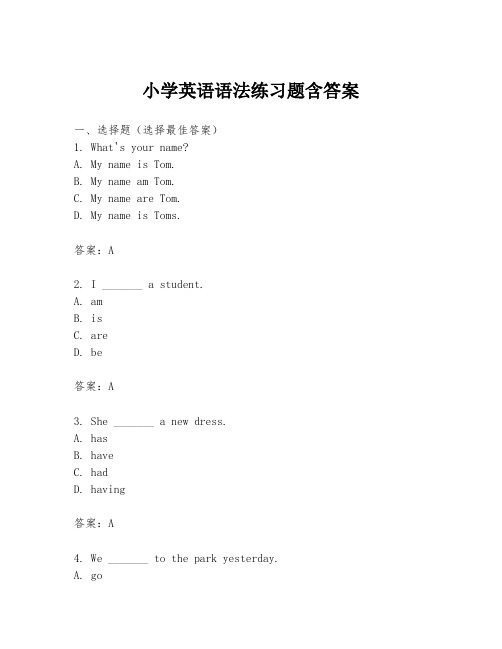
小学英语语法练习题含答案一、选择题(选择最佳答案)1. What's your name?A. My name is Tom.B. My name am Tom.C. My name are Tom.D. My name is Toms.答案:A2. I _______ a student.A. amB. isC. areD. be答案:A3. She _______ a new dress.A. hasB. haveC. hadD. having答案:A4. We _______ to the park yesterday.A. goB. goesC. wentD. going答案:C5. They _______ at 8:00 in the morning.A. get upB. gets upC. getting upD. are getting up答案:A二、填空题(用括号内所给词的适当形式填空)6. There _______ (be) a lot of books in the library. 答案:are7. My mother _______ (not work) on Sundays.答案:doesn't work8. The children _______ (play) in the garden now.答案:are playing9. She _______ (go) to school by bus every day.答案:goes10. They _______ (have) lunch at 12:00.答案:have三、改错题(找出句子中的错误并改正)11. She is goes to the park.改正:She goes to the park.12. They are playing in the park. We are too.改正:They are playing in the park. We are too.13. He does his homework every evening.改正:He does his homework every evening.14. We are having a birthday party. Can you are coming? 改正:We are having a birthday party. Can you come?15. There is a lot of water in the bottle.改正:There is a lot of water in the bottle.四、翻译题(将下列句子翻译成英文)16. 我有一个哥哥和一个妹妹。
可打印小学英语语法大全-附练习题
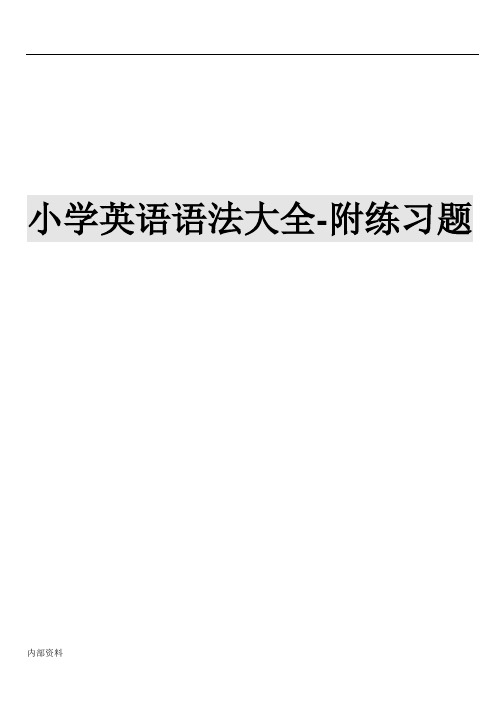
小学英语语法大全-附练习题Contents第一章名词1.名词的数2.名词的格第二章代词1.人称代词2.物主代词第三章冠词与数词1.冠词2.数词第四章一般现在时态第五章现在进行时态第六章句型1.陈述句2.疑问句3.祈使句4.There be 句型与have\ has第七章总结考试第一章名词(Noun)名词的概念在生活中,我们会接触到各种各样的人和事物,用来表示这些人或事物名称的词就是名词。
一、名词的数名词的数指名词的单数和复数形式。
可数名词表示“一个”时用单数,“两个以上”时用复数;不可数名词表示量时,通常用“数词+单位+of+物质名词”的形式,如a piece of bread (一片面包),变为复数时,只须将单位名词变为复数,如:two pieces of bread(两片面包)。
*名词复数的构成法则1. 一般情况下在词尾加 s. 词尾读音shop --- shops (商店) 在清辅音后读[ s ]bag --- bags (书包) 在浊辅音后读[ z ]window --- windows (窗户) 在元音后读[ z ]2. 以s, x, sh, ch 结尾的单词在词尾加es。
class --- classes (班级) 词尾读音[ iz ]box --- boxes (盒子)match --- matches (比赛)brush --- brushes (刷子)3. 以“辅音字母+y”结尾的词,变y为i 加es.story --- stories (故事) 词尾读音[ iz ]4. 以“元音字母+y”结尾的词,在词尾直接加skey --- keys 词尾读音[ z ]monkey --- monkeys5.以“o”结尾的名词,复数一般在词尾加“s”, 但个别加“es”tomato --- tomatoes (西红柿) 词尾读音[ z ]potato --- potatoes (土豆)zoo --- zoos (动物园)photo --- photos (照片)*(以“o”结尾,复数加“es”)口诀:黑人(Negro)英雄(hero),左手拿着西红柿(tomato),右手拿着破土豆(potato),头顶一个大芒果(mango)。
小学英语语法练习题及答案

小学英语语法练习题及答案小学英语语法练习题及答案【篇一:小学英语语法及练习题--名词】定义名词可以分为专有名词和普通名词,专有名词是某个(些)人,地方,机构等专有的名称,如beijing,china等。
普通名词是一类人或东西或是一个抽象概念的名词,如:book,sadness等。
普通名词又可分为下面四类:1)个体名词:表示某类人或东西中的个体,如:gun。
2)集体名词:表示若干个个体组成的集合体,如:family。
4)抽象名词:表示动作、状态、品质、感情等抽象概念,如:work。
个体名词和集体名词可以用数目来计算,称为可数名词,物质名词和抽象名词一般无法用数目计算,称为不可数名词。
2. 名词复数的规则变化(情况,构成方法,读音,例词)a. 一般情况在名词后加-s清辅音后读/s/map-maps浊辅音和元音后读 /z/bag-bags /car-carsb. 以s, sh, ch, x等结尾的名词加-es读 /iz/bus-buses/ watch-watches/brush-brushes/box-boxesc. 以ce, se, ze,等结尾加 -s读 /iz/license-licensesd. 以辅音字母+y结尾的名词把变y 为i再加es读 /z/baby---babiese. 以o 结尾的名词,变复数时:1). 加s,如: photo---photos piano---pianosradio---radioszoo---zoos;2). 加es,如:potato--potatoes tomato--tomatoes3). 上述a和b两种方法均可,如zero---zeros / zeroes。
f. 以f或fe 结尾的名词变复数时:1). 加s,如: belief---beliefsroof---roofssafe---safes gulf---gulfs2). 去f, fe 加ves,如:half---halvesknife---knives leaf---leaves wolf---wolveswife---wives life---lives thief---thieves3). 上述a和b两种方法均可,如handkerchief: handkerchiefs / handkerchieves。
完整版)小学英语语法及练习题
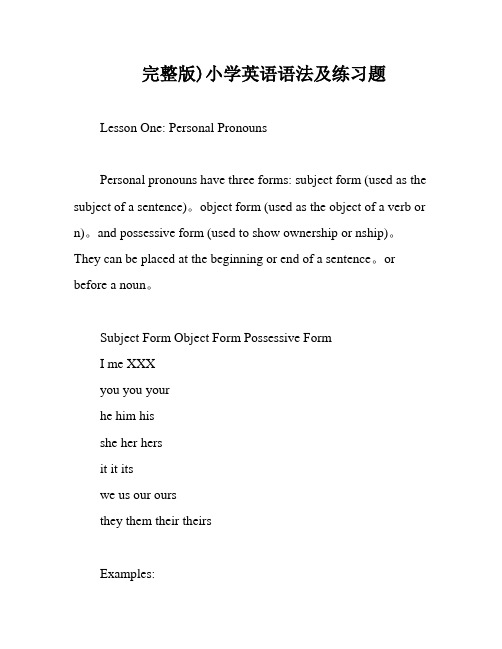
完整版)小学英语语法及练习题Lesson One: Personal PronounsPersonal pronouns have three forms: subject form (used as the subject of a sentence)。
object form (used as the object of a verb or n)。
and possessive form (used to show ownership or nship)。
They can be placed at the beginning or end of a sentence。
or before a noun。
Subject Form Object Form Possessive FormI me XXXyou you yourhe him hisshe her hersit it itswe us our oursthey them their theirsExamples:1.Are these your pencils。
Yes。
they are ours.2.Whose is this pencil。
It's XXX.3.I love them very much.4.XXX.5.Miss Li often looks after her XXX.6.Are these their bags。
No。
they XXX.7.That is not my kite。
That kite is very small。
but mine is very big.8.The dress is hers。
Give it to her.9.Is this your watch。
No。
it's not XXX.1.This bike is my sister's。
It belongs to her.2.This isn't my book。
- 1、下载文档前请自行甄别文档内容的完整性,平台不提供额外的编辑、内容补充、找答案等附加服务。
- 2、"仅部分预览"的文档,不可在线预览部分如存在完整性等问题,可反馈申请退款(可完整预览的文档不适用该条件!)。
- 3、如文档侵犯您的权益,请联系客服反馈,我们会尽快为您处理(人工客服工作时间:9:00-18:30)。
小学英语语法及习题一、名词复数规则1.一般情况下,直接加-s,如:book-books, bag-bags, cat-cats, bed-beds 2.以s. x. sh. ch结尾,加-es,如:bus-buses, box-boxes, brush-brushes, watch-watches3.以“辅音字母+y”结尾,变y为i, 再加-es,如:family-families, strawberry-strawberries4.以“f或fe”结尾,变f或fe为v, 再加-es,如:knife-knives5.不规则名词复数:man-men,woman-women,policeman-policemen,policewoman-policewomen,mouse-micechild-children,foot-feet,.tooth-teethfish-fish, people-people, Chinese-Chinese, Japanese-Japanese写出下列各词的复数I _________him _________this ___________her ______watch _______child _______photo ________diary ______day________ foot________ book_______ dress ________tooth_______ sheep ______box_______ strawberry _____thief _______yo-yo ______ peach______ sandwich ______man______ woman_______ paper_______ juice___________water________ milk________ rice__________ tea__________二、一般现在时 一般现在时的功能 1.表示事物或人物的特征、状态。
如:The sky is blue.天空是蓝色的。
2.表示经常性或习惯性的动作。
如:I get up at six every day.我每天六点起床。
3.表示客观现实。
如:The earth goes around the sun.地球绕着太阳转。
一般现在时的构成 1. be动词:主语+be(am,is,are)+其它。
如: I am a boy.我是一个男孩。
2.行为动词:主语+行为动词(+其它)。
如:Mary likes Chinese.玛丽喜欢汉语。
1. be动词的变化。
否定句:主语+ be + not +其它。
如:He is not a worker.他不是工人。
一般疑问句:Be +主语+其它。
如:-Are you a student? -Yes. I am. / No, I'm not. 特殊疑问句:疑问词+一般疑问句。
如:Where is my bike? 2.行为动词的变化。
否定句:主语+ don't( doesn't ) +动词原形(+其它)。
如: I don't like bread. 当主语为第三人称单数时,要用doesn't构成否定句。
如: He doesn't often play. 一般疑问句:Do( Does ) +主语+动词原形+其它。
如: - Do you often play football? - Yes, I do. / No, I don't. 当主语为第三人称单数时,要用does构成一般疑问句。
如: - Does she go to work by bike? - Yes, she does. / No, she doesn't.特殊疑问句:疑问词+一般疑问句。
如:How does your father go to work?动词+s的变化规则1.一般情况下,直接加-s,如:cook-cooks, milk-milks2.以s. x. sh. ch. o结尾,加-es,如:guess-guesses, wash-washes, watch-watches, go-goes3.以“辅音字母+y”结尾,变y为i, 再加-es,如:study-studies一般现在时用法专练:一、写出下列动词的第三人称单数drink ________ go _______ stay ________ make ________look _________ have_______ pass_______ carry ____come________ watch______ plant_______ fly ________study_______ brush________ do_________ teach_______二、用括号内动词的适当形式填空。
1. He often ________(have) dinner at home.2. Daniel and Tommy _______(be) in Class One.3. We _______(not watch) TV on Monday.4. Nick _______(not go) to the zoo on Sunday.5. ______ they ________(like) the World Cup?6. What _______they often _______(do) on Saturdays?7. _______ your parents _______(read) newspapers every day?8. The girl _______(teach) us English on Sundays.9. She and I ________(take) a walk together every evening.10. There ________(be) some water in the bottle.11. Mike _______(like) cooking.12. They _______(have) the same hobby.13. My aunt _______(look) after her baby carefully.14. You always _______(do) your homework well.15. I _______(be) ill. I’m staying in bed.16. She _______(go) to school from Monday to Friday.17. Liu Tao _______(do) not like PE.18. The child often _______(watch) TV in the evening.19. Su Hai and Su Yang _______(have) eight lessons this term.20. -What day _______(be) it today?- It’s Saturday.三、按照要求改写句子1. Daniel watches TV every evening.(改为否定句)___________________________________________________2. I do my homework every day.(改为一般疑问句,作否定回答)________________________________________________________ 3. She likes milk.(改为一般疑问句,作肯定回答)___________________________4. Amy likes playing computer games.(改为一般疑问句,作否定回答) ___________________________________________________5. We go to school every morning.(改为否定句)_______________________________________________________ 6. He speaks English very well.(改为否定句)___________________________________________________7. I like taking photos in the park.(对划线部分提问)________________________________________________________ 8. John comes from Canada.(对划线部分提问)___________________________________________________9. She is always a good student.(改为一般疑问句,作否定回答)________________________________________________________ 10. Simon and Daniel like going skating.(改为否定句)___________________________________________________五、改错(划出错误的地方,将正确的写在横线上)1. Is your brother speak English? __________________2. Does he likes going fishing? __________________3. He likes play games after class. __________________4. Mr. Wu teachs us English. __________________5. She don’t do her homework on Sundays. _________________三、现在进行时1.现在进行时表示现在正在进行或发生的动作,也可表示当前一段时间内的活动或现阶段正在进行的动作。
2.现在进行时的肯定句基本结构为be+动词ing.3.现在进行时的否定句在be后加not。
4.现在进行时的一般疑问句把be动词调到句首。
5.现在进行时的特殊疑问的基本结构为:疑问词 + be + 主语 + 动词ing?但疑问词当主语时其结构为:疑问词 + be + 动词ing?动词加ing的变化规则1.一般情况下,直接加ing,如:cook-cooking2.以不发音的e结尾,去e加ing,如:make-making, taste-tasting3.如果末尾是一个元音字母和一个辅音字母,双写末尾的辅音字母,再加ing,如:run-running, stop-stopping现在进行时专项练习:一、写出下列动词的现在分词:play________ run__________ swim _________make__________go_________ like________ write________ _ski___________read________ have_________ sing ________ dance_________put_________ see________ buy _________ love____________live_______ take_________ come ________ get_________stop_________ sit ________ begin________ shop___________二、用所给的动词的正确形式填空:1. The boy __________________ (draw) a picture now.2. Listen .Some girls _______________ (sing) in the classroom.3. My mother _________________ (cook) some nice food now.4. What _____ you ______ (do) now?5. Look. They _______________ (have) an English lesson.6. They ____________ (not, water) the flowers now.7. Look! The girls ________________(dance )in the classroom .8. What is our granddaughter doing? She _________(listen ) to music.9. It’s 5 o’clock now. We _____________ (have) supper now10.______Helen____________(wash )clothes? Yes, she is.三、句型转换:1. They are doing housework. (分别改成一般疑问句和否定句)2.The students are cleaning the classroom . ( 改一般疑问句并作肯定和否定回答)______________________________________________________________________________________________________________________ 3.I’m playing the football in the playground .(对划线部分进行提问)__________________________________________________________ 4.Tom is reading books in his study . (对划线部分进行提问)__________________________________________________________四、一般将来时一、概念:表示将要发生的动作或存在的状态及打算、计划或准备做某事。
